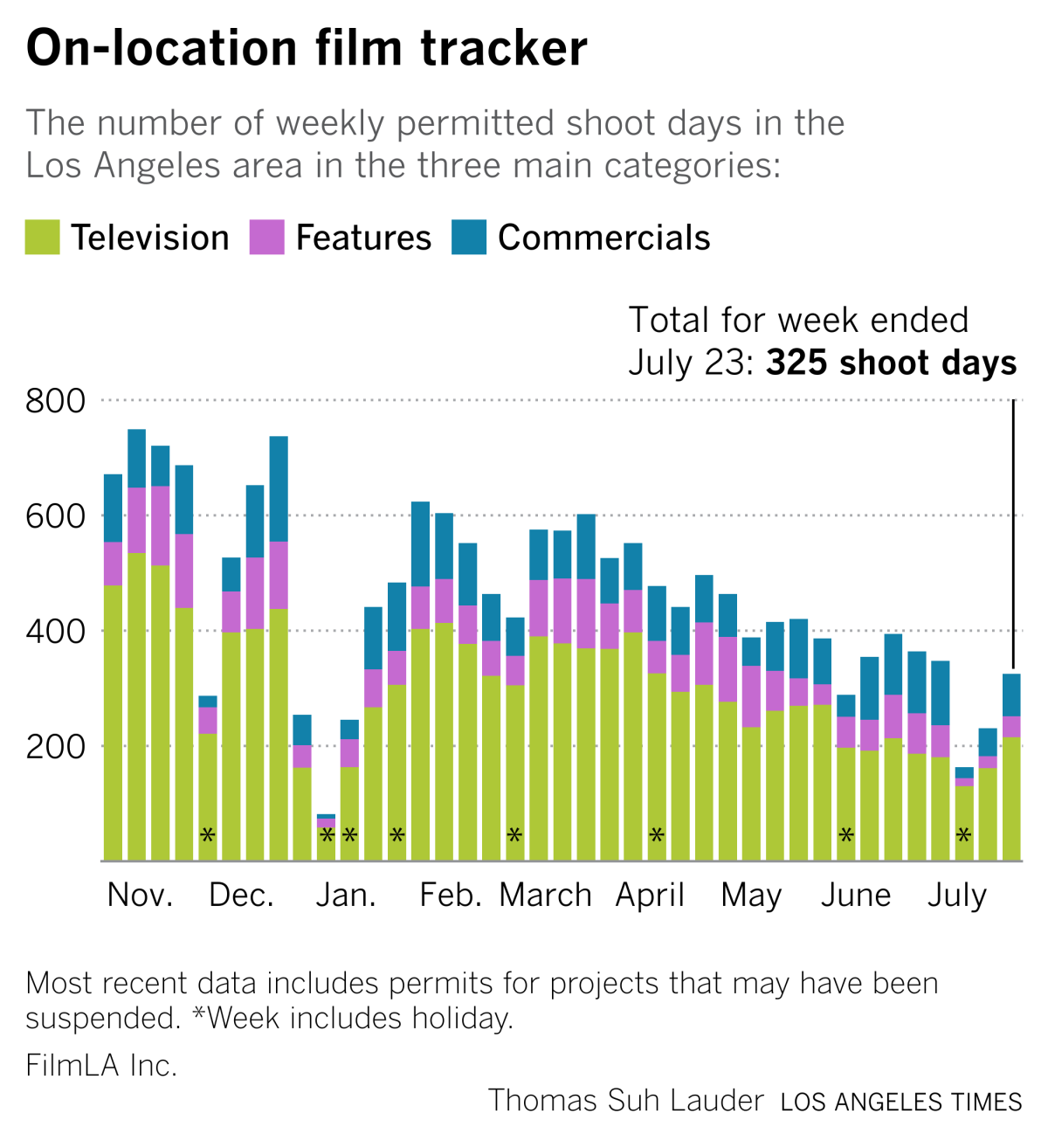After explosive ‘Barbenheimer’ weekend, the movie business needs to get out of its own way

Welcome to the Wide Shot, a newsletter about the business of entertainment. Sign up here to get it in your inbox.
The movie business has been through some wild mood swings since the COVID-19 pandemic, with the utter elation following the success of “Barbie” and “Oppenheimer” being the latest example, coming after what has been a rocky summer at the multiplex.
“It’s so over / We’re so back.”
So goes the social media catchphrase-turned-meme that captures the emotional journey of toggling between depression and mania, accompanying bad news on one extreme (a “Mission: Impossible” movie underperformed? It’s so over) and good news on the other (“Barbenheimer”! We’re so back).
Movie fans are on a major “We’re so back” high right now, and with good reason.
Warner Bros.’ “Barbie” opening with a mind-blowing $162 million in the U.S. and Canada (even better than the studio’s preliminary estimate of $155 million) combined with Universal’s “Oppenheimer” debuting to $82.4 million resulted in one of the biggest domestic weekends ever, not adjusting for inflation.
Greta Gerwig’s “Barbie,” backed by an elaborate marketing campaign and the star power of Margot Robbie and Ryan Gosling, scored the highest opening weekend for a film directed by a woman. The numbers for Christopher Nolan’s “Oppenheimer” are also staggering, especially given that it’s a talky, R-rated historical drama without a big-name star in the lead role — no offense to Cillian Murphy, who plays theoretical physicist J. Robert Oppenheimer, and all the devotees of his show “Peaky Blinders.”
The Oscar buzz has begun. The stock price of Barbie doll-maker Mattel has climbed some 20% during the last month. People are going to the movies, with groups of friends dressed in bright pink.
It’s tempting, amid the celebration, to draw sweeping lessons from Hollywood’s big wins.
Are audiences growing tired of established intellectual property? After movies including “Fast X,” “The Flash,” “Indiana Jones and the Dial of Destiny” and “Mission: Impossible — Dead Reckoning Part One” all disappointed to varying degrees, “Barbie” and “Oppenheimer” each represent something fresh. It’s not enough to give people more of what they’ve seen before, the thinking goes. There’s some truth to that in the case of certain aging franchises, but the idea that studios are going to move away from sequels and reboots is far-fetched.
With both the weekend’s winners, the studios granted creative freedom to singular filmmakers and reaped the benefits. It also helps that neither cost anywhere near the $300-million budgets commanded by some of the summer’s priciest wannabe blockbusters. And clearly, in the case of “Barbie,” there was pent-up demand for a major non-R-rated “event movie” aimed primarily at young women, considering that the studios’ big bets this season have leaned heavily in the male-oriented action-adventure genre. Something similar happened for “The Super Mario Bros. Movie” after a drought of family-friendly films.
None of these factors would have mattered much if the movies were bad.
Both had Rotten Tomatoes critic scores that were at least 90% “fresh.” That doesn’t mean that good movies will always succeed or that bad movies are doomed to fail, even in a world where people have more at-home entertainment options than ever, with TikTok and other apps. But it does indicate that the margin for error has evaporated.
TD Cowen analyst Doug Creutz, in a Sunday note to clients, estimated that Hollywood’s recent weak performers would have done at least 20% better in a more forgiving pre-COVID-19 environment. “The lesson here is less about the success of non-franchise content and more about the success of great content (and worsening returns for mediocre content),” Creutz wrote.
But people should resist the desire to over-analyze. It’s not just that the movies were good. It’s also that they were special in ways that Rotten Tomatoes data can’t capture. And the serendipity with which they worked side by side to create a cultural sensation that no studio marketing team could manufacture.
There have been moments before when two very different movies scored at the box office. Counter-programming has been a traditional feature of the film business, with another Nolan drama serving as a prime example when “The Dark Knight” opened opposite the female-skewing musical “Mamma Mia!” Still, the memes surrounding the “Barbenheimer” phenomenon surely gave both pictures a need-to-see urgency. People wanted to be a part of it. There’s no easy way to replicate that feeling.
Moreover, it’s unclear whether the industry will build momentum from last weekend’s explosion of moviegoing. If audiences who returned to theaters for “Barbie” and “Oppenheimer” had a good time and want to come back, there still need to be films to look forward to in the next few weeks. Maybe Disney’s “Haunted Mansion” this Friday? Or “Teenage Mutant Ninja Turtles: Mutant Mayhem” and “Meg 2: The Trench” next week? Beyond that, the release schedule looks a little thin.
With the actors’ and writers’ strikes still raging, and with neither the guilds nor the studios engaging in talks to resolve their contract disputes, it’s going to get worse.
Members of SAG-AFTRA, the performers’ union, won’t promote the studios’ upcoming releases, and having beautiful people talking about movies on TV is a huge part of any marketing campaign. Highly anticipated releases are already being pushed back.
Luca Guadagnino’s tennis movie “Challengers,” starring Zendaya and originally slated to premiere at the Venice International Film Festival on Aug. 30, now won’t hit theaters until late April. A movie like that is risky enough as it is, but without its star walking the red carpet, it’s probably dead on arrival. Too much of that kind of thing will deflate business in a way not seen since the pandemic shuttered theaters.
The movie industry won’t stop getting in its own way. It’s so over. We’re so back. Repeat.
Stuff we wrote
— Social media stars try to navigate Hollywood’s hot strike summer. Influencers — who make their livings as entertainers but aren’t typically part of entertainment unions — now face the complicated labor politics of a Hollywood strike wave.
— These projects, including a Mel Gibson movie, can keep filming amid SAG-AFTRA strike. SAG-AFTRA is allowing a select number of films and shows to keep filming amid the actors’ strike. Titles include two A24 movies.
— Not just writers and actors: crew workers struggle through Hollywood’s strikes. Workers in film and TV, most of whom are pro-union, have been trying to make ends meet amid a dual strike of Hollywood actors and writers.
— ‘Rust’ prosecutors turn focus on movie armorer Hannah Gutierrez Reed in shooting. Prosecutors in the case that began when Alec Baldwin accidentally shot and killed cinematographer Halyna Hutchins nearly two years ago have argued that the armorer, Hannah Gutierrez Reed, is most culpable and should face felony charges.
— ‘Shark Tank’s’ Daymond John granted permanent restraining order against former contestants. The ruling is the latest step in a legal dispute between John and Al “Bubba” Baker, his daughter, Brittani, as well as his wife, Sabrina. The ruling makes permanent the temporary restraining order and preliminary injunction granted by Judge Robert Kugler against the Bakers last month.
— ICYMI. Biden’s Labor nominee is staying put, but may not help with Hollywood strikes. Former ABC News producer pleads guilty in child pornography case. AMC abandons plan to charge more for the best movie theater seats. RIP, Santa Barbara’s 150-year-old newspaper.
Number of the week

Netflix’s plan to push freeloaders to pay up appears to be working, though perhaps not as fast as investors want. The company added 5.9 million subscribers during the second quarter, which was significantly more than analysts expected.
However, the company’s revenue of $8.2 billion, up about 3% year over year, fell short of expectations, sending the stock tumbling last week. Go figure. Wall Street is actually looking at the fundamentals of the business rather than just the subscriber counts.
Average revenue per user (ARPU) was down 3%, which suggests that many of the people who signed up for their own accounts after the password-sharing crackdown chose less expensive ad-based tiers.
No wonder Netflix also said last week that it would eliminate its cheapest ad-free plan for new and returning users in the U.S. and Britain, which costs $9.99 a month, as it tries to boost its revenue and profits. Price hikes have been going around lately. Spotify on Monday said it would bump up its monthly subscription fees by as much as $2.
Not to be discounted is the likely damage on the whole industry, including Netflix, from the writers’ and actors’ strikes, which will limit the supply of new content.

No missing commas or zeros here. That’s the penalty to NBCUniversal for trimming ficus trees without pulling permits (first-time offense), according to L.A. City Controller Kenneth Mejia, after the shade-denying foliage flap became a rallying cry on the WGA and SAG-AFTRA picket line.
Best of the web
— We’re all background actors, says the New York Times.
— Not even Tom Cruise can charm China’s moviegoers into seeing Hollywood films. (Wall Street Journal)
— A decade ago, Jeff Bezos bought the Washington Post. Now he’s actually paying attention to it. (NYT)
Film shoots
Film and TV production has plummeted in L.A. The number of shoot days crashed during the second quarter, according to FilmLA. Here are the latest weekly figures.

Finally ...
Minor “Barbie” spoiler here.
The hit film includes a key scene in which the song “Push” from the much-maligned pop rock band Matchbox Twenty features prominently, believe it or not. Kudos to the person who thought to call up Rob Thomas for a Q&A. Don’t worry, the singer is a good sport about it.
The Wide Shot is going to Sundance!
We’re sending daily dispatches from Park City throughout the festival’s first weekend. Sign up here for all things Sundance, plus a regular diet of news, analysis and insights on the business of Hollywood, from streaming wars to production.
You may occasionally receive promotional content from the Los Angeles Times.




